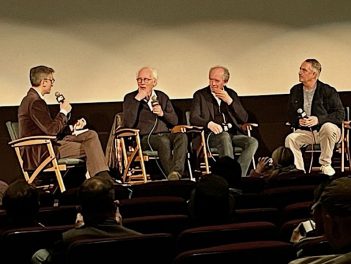By Robert St. Martin
 Los Angeles, CA (The Hollywood Times) 3/29/23 – Last night at the Aero Theatre in Santa Monica, the American Cinematheque hosted the Jean-Pierre Dardenne and Luc Dardenne at a screening of their latest film Tori and Lokita (Belgium, in French, 2022), as part of a larger retrospective of the films of the Dardenne brothers. The cinema of the Dardenne brothers has almost become a genre unto itself. Especially with their breakout film La Promesse (1996), Jean-Pierre and Luc have forged out a distinctive naturalistic style entrenched in social realism. Their latest, Tori and Lokita, is no different, exhibiting their proficiency at telling important, relevant stories. The film is deeply affecting, and it certainly speaks with a searing truth. Winner of this year’s Cannes Film Festival’s 75th Anniversary Prize, Tori and Lokita screened to a full house at the Aero and was followed by a most informative Q&A with the Dardenne brothers.
Los Angeles, CA (The Hollywood Times) 3/29/23 – Last night at the Aero Theatre in Santa Monica, the American Cinematheque hosted the Jean-Pierre Dardenne and Luc Dardenne at a screening of their latest film Tori and Lokita (Belgium, in French, 2022), as part of a larger retrospective of the films of the Dardenne brothers. The cinema of the Dardenne brothers has almost become a genre unto itself. Especially with their breakout film La Promesse (1996), Jean-Pierre and Luc have forged out a distinctive naturalistic style entrenched in social realism. Their latest, Tori and Lokita, is no different, exhibiting their proficiency at telling important, relevant stories. The film is deeply affecting, and it certainly speaks with a searing truth. Winner of this year’s Cannes Film Festival’s 75th Anniversary Prize, Tori and Lokita screened to a full house at the Aero and was followed by a most informative Q&A with the Dardenne brothers.
 Tori and Lokita claim to be siblings – brother and sister not by blood but by shared experience – find themselves in Belgium after escaping hardship in their home countries of Cameroon and Benin. The younger of the two, Tori, fled from cruel accusations of sorcery, helped by teenager Lokita during their passage via boat to Italy then Belgium. Lokita is without papers and their brother-sister relation is questioned by immigration officers, alighting part of the conflict and tension in Tori and Lokita. To pay the man who smuggled them into the country, they deliver both pizza and drugs for an abusive chef in the area.
Tori and Lokita claim to be siblings – brother and sister not by blood but by shared experience – find themselves in Belgium after escaping hardship in their home countries of Cameroon and Benin. The younger of the two, Tori, fled from cruel accusations of sorcery, helped by teenager Lokita during their passage via boat to Italy then Belgium. Lokita is without papers and their brother-sister relation is questioned by immigration officers, alighting part of the conflict and tension in Tori and Lokita. To pay the man who smuggled them into the country, they deliver both pizza and drugs for an abusive chef in the area.
 Non-professional actors Mbundu Joely and Pablo Schils as Lokita and Tori respectively have so much to do in the film. Frequent close-ups of faces and dynamic long takes, which are so synonymous with other Dardenne films such as Rosetta (1999), require a constant intensity and dedication from the actors. Joely brings a stoic maturity to her teenage character whilst Schils is similarly old beyond his years, but also charmingly funny and playful. Their relationship, which is so important to maintaining the humanistic, hopeful angle to Tori and Lokita, is wholly endearing and believable, one based on unerring loyalty and love. They seem inseparable and, at the Q&A with the Dardenne Brothers after the screening, they revealed that original idea for the film was an African immigrant mother who told her two children to never part company.
Non-professional actors Mbundu Joely and Pablo Schils as Lokita and Tori respectively have so much to do in the film. Frequent close-ups of faces and dynamic long takes, which are so synonymous with other Dardenne films such as Rosetta (1999), require a constant intensity and dedication from the actors. Joely brings a stoic maturity to her teenage character whilst Schils is similarly old beyond his years, but also charmingly funny and playful. Their relationship, which is so important to maintaining the humanistic, hopeful angle to Tori and Lokita, is wholly endearing and believable, one based on unerring loyalty and love. They seem inseparable and, at the Q&A with the Dardenne Brothers after the screening, they revealed that original idea for the film was an African immigrant mother who told her two children to never part company.
 As their difficult situation becomes increasingly desperate, this hopefulness inevitably expires from Tori and Lokita. Admirably, the Dardenne brothers resist any melodrama, instead grounding the film in vividly realistic cruelty. Blunt and stripped-back in a similar way to Ken Loach’s British drama I, Daniel Blake (2016), Tori and Lokita’s style reflects its characters’ bare, bleak existence. The best scenes in the Dardennes’ latest film observe the tender interactions between the two characters, African immigrants struggling to survive in a new land that despises them for their skin color, their national origin, and their poverty.
As their difficult situation becomes increasingly desperate, this hopefulness inevitably expires from Tori and Lokita. Admirably, the Dardenne brothers resist any melodrama, instead grounding the film in vividly realistic cruelty. Blunt and stripped-back in a similar way to Ken Loach’s British drama I, Daniel Blake (2016), Tori and Lokita’s style reflects its characters’ bare, bleak existence. The best scenes in the Dardennes’ latest film observe the tender interactions between the two characters, African immigrants struggling to survive in a new land that despises them for their skin color, their national origin, and their poverty.
 There are also challenges from police who harass immigrants, government bureaus that could deport Lokita, an African gang that paid to bring Lokita to Belgium and extorts most of the money she makes, and the everyday indignities of urban life. The most insistent threat comes from Betim (Alban Ukai) and his crew, who are focused on their drug business. When Lokita gets a job tending Betim’s drug greenhouse, she becomes a prisoner who is not allowed to use a cell phone to contact anyone, including Tori. No matter how coldly her employers/captors behave, Lokita does her best to survive in this dreadful cannabis hot house.
There are also challenges from police who harass immigrants, government bureaus that could deport Lokita, an African gang that paid to bring Lokita to Belgium and extorts most of the money she makes, and the everyday indignities of urban life. The most insistent threat comes from Betim (Alban Ukai) and his crew, who are focused on their drug business. When Lokita gets a job tending Betim’s drug greenhouse, she becomes a prisoner who is not allowed to use a cell phone to contact anyone, including Tori. No matter how coldly her employers/captors behave, Lokita does her best to survive in this dreadful cannabis hot house.
 The scenes tend to unfold in just one take. The “you-are-there” style works better in films like this than in stories about more privileged characters (Ken Loach does it brilliantly as well), because what defines Tori and Lokita’s life more than anything else is urgency. Everything is present-tense. They don’t have enough time, they don’t have enough money, and they’re surrounded by people who exploit, harass, or ignore them. They have to keep moving, and keep their eyes and ears on hyper-alert as they travel around the city delivering pizza or drugs for the chef/drug dealer Betim. A simple mistake could get them deported, jailed, or killed. I won’t describe the ending which is so bleak that it will haunt viewers much like the tragic Neorealistic films of the 1940s that the Dardenne films often evoke, especially “Bicycle Thieves” and “Rome, Open City.” Yet there is an almost mythic, mysterious aspect to this tale of sacrifice and desire that evokes the aesthetic of Robert Bresson.
The scenes tend to unfold in just one take. The “you-are-there” style works better in films like this than in stories about more privileged characters (Ken Loach does it brilliantly as well), because what defines Tori and Lokita’s life more than anything else is urgency. Everything is present-tense. They don’t have enough time, they don’t have enough money, and they’re surrounded by people who exploit, harass, or ignore them. They have to keep moving, and keep their eyes and ears on hyper-alert as they travel around the city delivering pizza or drugs for the chef/drug dealer Betim. A simple mistake could get them deported, jailed, or killed. I won’t describe the ending which is so bleak that it will haunt viewers much like the tragic Neorealistic films of the 1940s that the Dardenne films often evoke, especially “Bicycle Thieves” and “Rome, Open City.” Yet there is an almost mythic, mysterious aspect to this tale of sacrifice and desire that evokes the aesthetic of Robert Bresson.